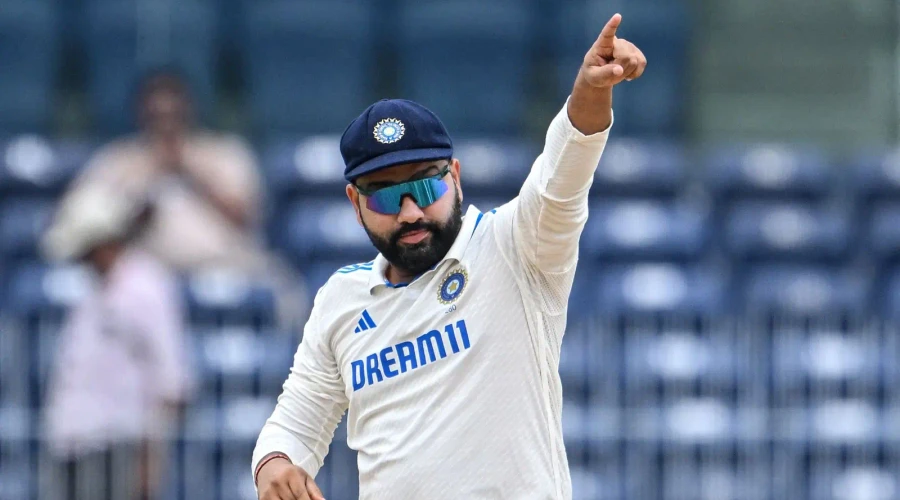Rohit Sharma’s leadership has taken Indian cricket to new heights, even when his batting performance in the latest Test series against Bangladesh was not extraordinary. Across both matches of the series, Rohit scored only 42 runs—6 and 5 runs in the Chennai Test and 23 and 8 runs in Kanpur. However, those 42 runs played a pivotal role in helping India secure a 2-0 series victory. The team’s triumph added crucial points to India’s standings in the World Test Championship, further solidifying its position among the top cricketing nations.
What makes this victory remarkable is how the Indian team, under Rohit’s captaincy, overcame what seemed like insurmountable odds. The team played just 52 overs in both innings of the Kanpur Test and yet managed to secure a win in a match many had already written off as a likely draw.
Turning the Impossible into Reality
The Kanpur Test presented a unique challenge. Only 35 overs were played on the first day, and no play was possible on the second and third days due to weather interruptions. Even by the fourth day, it appeared that a draw was the most probable outcome, with Bangladesh having batted 40 overs and scored 233 runs in the first innings.
Despite the limited time left in the match, Rohit Sharma’s leadership made all the difference. His aggressive strategy and the fearless approach he has instilled in the team were key factors. The team needed to bat at an extraordinary pace to have any chance of forcing a win, and Rohit led from the front by setting the tone.
Rohit Sharma’s Leadership on Display
As captain, Rohit did not focus on his performance but instead concentrated on setting an example for his team. India needed to pile on the runs quickly to put Bangladesh back into bat, and Rohit initiated an aggressive batting strategy. Opening with Yashasvi Jaiswal, Rohit took charge. Jaiswal hit three boundaries in the very first over, and Rohit followed suit by smashing two sixes in the second over. Within just three overs, India had already added 50 runs to the scoreboard.
This explosive start was crucial in showing the rest of the team how to approach the innings. Every player who came to the crease followed Rohit’s aggressive lead, and India went on to score 285 runs in just 34.4 overs—a staggering run rate of 8.22, which is almost unheard of in Test cricket.
Although Rohit himself contributed only 23 runs, it was his leadership that showed the team the path to victory. His aggressive intent sent a clear message to the rest of the lineup, which followed through with the same intensity.
A Balanced Team Effort
One of the defining characteristics of Rohit Sharma’s captaincy is how well-rounded the team has become. Every player is ready to give their best, regardless of the circumstances. While Rohit’s contribution with the bat was modest, other players stepped up when it mattered most.
R Ashwin’s century came at a critical moment, while Ravindra Jadeja provided immense support. Rishabh Pant’s timely century added to the team’s momentum, and Shubman Gill’s century was another highlight. In addition, Yashasvi Jaiswal’s consistency in both innings of the Kanpur Test helped anchor the innings. Even the bowlers were key contributors, with Jasprit Bumrah taking an impressive 11 wickets in just two matches.
KL Rahul also played his part with the bat, and Akashdeep’s late flourish, which included two sixes, helped India gain a 50-run lead over Bangladesh. This well-rounded effort is a testament to the culture Rohit has fostered within the team—every player knows their role, and each one is ready to give 100 percent when their time comes.
Shifting Mindsets: The Rohit Sharma Effect
Rohit Sharma’s leadership has been transformative, not just in terms of strategy but also in the mindset of the players. His ability to remove the fear of defeat from his team has been one of his most significant contributions as captain. Every player now steps onto the field believing they can win, regardless of the situation. This fearlessness is what sets this Indian team apart from previous ones.
In an interview, Rohit once reflected on his experience in the 2019 World Cup, where he scored five centuries and amassed over 650 runs, only to see India fall short of winning the tournament. That experience changed his perspective on cricket. He realized that individual performances, while important, do not guarantee victories. Since then, his focus has been solely on ensuring that the team wins, even if it means sacrificing personal milestones.
This team-first mentality is now deeply ingrained in the Indian side. Rohit has successfully passed on this philosophy to the rest of the squad, and it is evident in the way each player contributes to the team’s success. Whether it’s scoring runs, taking wickets, or even fielding, every player is fully committed to the collective goal of winning for India.
Outpacing the ‘Bazball’ Phenomenon
In recent years, the term ‘Bazball’—an aggressive style of Test cricket named after England’s coach Brendon McCullum—has gained popularity. This approach involves scoring at a fast pace, often at 5-6 runs per over, and playing Test cricket with the intensity of an ODI match. England has found success with this style, but India’s recent victory under Rohit Sharma suggests that the team has found its aggressive formula, one that works even better.
In the Kanpur Test, India’s scoring rate of 8.22 runs per over surpassed anything that ‘Bazball’ has produced. It was a clear demonstration that India can play aggressive, modern Test cricket, but on its terms. Under Rohit’s leadership, Team India has become a side that can adapt to any situation and find a way to win, even when the odds are stacked against them.
With Rohit at the helm, India has entered a new era of Test cricket, one where fearlessness, aggression, and collective responsibility define the team’s approach.


